Birth of Jesus: A Palestinian Tale
Reading Time: 9 min
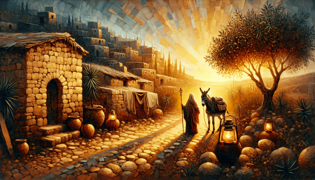
About Story: Birth of Jesus is a from palestinian set in the . This tale explores themes of and is suitable for . It offers insights. Biblestudytools, WhatChristiansWantToKnow, Christianity.com, Interesting Literature.
Introduction
Long before lanterns gleamed in every home and songs heralded the season, the hills of Judea lay quiet beneath an azure sky. In a modest stone house on the outskirts of Nazareth, Mary stirred from a deep sleep, her heart humming with a note of both wonder and trepidation. The air was cool and smelled of olive leaves and fresh rain. Outside, a mountain breeze rattled shutters like distant drumbeats, while the low coo of a turtledove seemed to echo her own still, small voice.
Betrothed to Joseph, a carpenter known for his gentle spirit and calloused hands, Mary felt the weight of destiny as surely as she felt the rough linen of her sleeping cloak. Though whispers of angelic visitation had stirred the very ground beneath her feet, she remained grounded in simple faith, like a spring flower pushing through stone. Each breath tasted of anticipation; each heartbeat was a drum heralding change. In the stillness, she heard life shifting around her like sand through fingers.
A knock at the door broke the hush. Joseph stood there, his face a map of concern and devotion. Together, they would soon set out for Bethlehem, the city of David, under imperial decree—and toward a birth that would ripple across centuries.
(The air held a faint scent of wood smoke and goat hair, promising warmth in the long night to come.)
1. The Journey to Bethlehem
Joseph led the donkey down the winding path as Mary perched gently on its back. Each footfall stirred up a whisper of dust that caught the morning sun like tiny stars. The scent of thyme and wild oregano filled the air, and the distant bleat of goats echoed over dry hills. Tiberias lay far behind them, and ahead, the ancient stones of Bethlehem awaited. As they rode, Mary’s hand rested on her swelling belly. She recalled the angel’s words—a promise wrapped in light brighter than any dawn. Joseph glanced back, worry etched around his dark eyes. He wrapped a worn woollen cloak tighter around her shoulders, muttering a prayer in the old Aramaic tongue.
By midday, they paused beside a cool spring hidden among tamarisk trees. The water tasted of earth and sky. Mary knelt to drink, feeling the clay stones beneath her knees like the firm truth of the world. Joseph poured water over her feet, and the coolness sent a quiver through her. They knew the census deadline loomed. The path ahead was rougher still, and Mary’s breath came quicker now, reminding her that their child would soon claim the starlit stage of prophecy. As a breeze swirled through the reeds, she whispered a song—soft and sweet, like a sparrow’s morning tune—welcoming the life within. The sun lowered, painting long shadows, and the couple moved on, their silhouettes joined like intertwined roots.
(Background sounds: water trickling, distant calls of shepherds.)
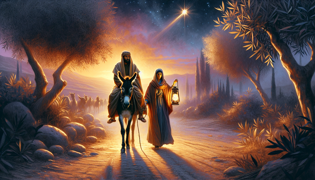
2. No Room at the Inn
Arriving at Bethlehem’s gates, Mary dismounted and leaned heavily on Joseph’s arm. The sun was high now, and the market square bustled with merchants and travellers. The aroma of fresh bread mingled with the tang of goats’ milk. Joseph approached the crowded inns one by one—doors slammed, voices rose, and each time he heard the same refrain: 'No room.' At the last inn, the innkeeper’s face was kind but his hands were full. He led them to a stable carved into the rock, where the soft nicker of mules and lowing of cattle filled the air. Though rough with straw and chipped stone walls, it offered shelter.
Inside, Mary traced the grain of the wooden manger. It smelled of hay, sweet and earthy, like the breath of fresh life. She placed her cloak over the straw, and Joseph struck flint against steel to kindle a small flame. Sparks drifted like fireflies before flaring into light. Shadows danced on the walls as Joseph arranged a cloth for her to lie upon. Mary settled down, her heart lingering between hope and pain. The world outside clamoured, yet in that humble cave, a hush fell—a pregnant pause before history’s heartbeat.
(A faint scent of livestock and warm straw filled the air.)
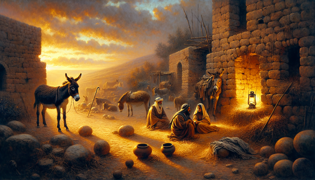
3. Shepherds in the Field
Nearby, on a gentle slope dotted with thorny shrubs, shepherds kept watch over their flocks. The air was cool and carried faint echoes of a distant stream. They huddled around a modest fire, sharing flatbread scorched at the edges. Suddenly, the night cracked open with light—brighter than the moon—so pure it seemed to peel back the dark like old parchment. The shepherds froze, their staffs trembling in bleary hands. An angel’s voice, clear as crystal, sang across the heavens: 'Fear not. For behold, I bring you good news of great joy…'
Sheep bleated and stamped, trying to retreat but finding no cover from that shining presence. More angels appeared, filling the sky like a silver sea, their voices a chorus of splendour. They spoke of a child born this night in David’s city, a Saviour wrapped in swaddling clothes. And then—just as swiftly as they came—they vanished, leaving the air humming with wonder. The shepherds exchanged awed glances, tossing their cloaks over broad shoulders. Under a canopy of countless stars, they hurried toward Bethlehem, hearts pounding like war drums.
(The night air smelled of smoke and dew-soaked grass.)
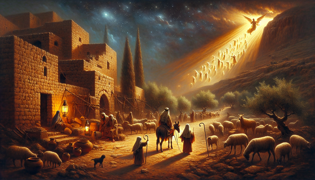
4. The Birth at Midnight
At the stroke of midnight’s hush, Mary felt a sudden tightening, like waves pulling at hidden stones. Joseph steadied her by the hand, voice calm as he wrapped her in the flickering lantern glow. Pain struck like fire, then ebbed into focus. In the stillness, she pushed once, and again—until, with a gentle cry, a newborn’s breath filled the air. Mary caught him in her arms; his tiny frame was soft as petals, warm as fresh bread. The lantern’s light haloed him, and for a moment, all time seemed to stop.
Joseph draped swaddling cloths he’d woven in Nazareth around the child. The texture was rough yet comforting, like a pledge of protection. He placed the baby in the manger, stilling the animals with his soft coo. The donkey nuzzled the straw beside him, and a cow leaned in, mistaking the babe’s hair for dew-silver hay. Mary’s tears fell onto her son’s cheek, salt like earth’s own promise. Beyond the stable door, faint hoofbeats and whispers of hurried shepherds drifted in. Here, in the heart of a silent night, hope found its first breath.
(The air was thick with the scent of hay and that first new life.)
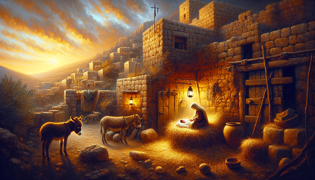
5. Gifts from the East
Days later, three travellers from distant lands threaded their way through rocky passes, guided by a star larger than any they’d known. Gold, frankincense, and myrrh lay packed in velvet-lined boxes, each scent promising reverence. They spoke little; their eyes shone with the solemn wonder of travellers on a divine trail. In Bethlehem, the streets buzzed with festival chatter, but the strangers found the stable easily, drawn by that same quiet light which had called the shepherds.
Kneeling before the infant king, they laid down their gifts. The gold glinted like liquid sun, while incense smoke curled skyward in gentle spirals. Myrrh’s bitter fragrance spoke of earth’s grief, hinting at the sorrow to come. Mary watched, her heart full, Joseph standing by with measured awe. The gifts sealed a promise: this child would bind heaven and earth. Outside, the night breeze carried the echo of their whispers. In that moment, the stable felt boundless as the cosmos.
(The rich, resinous scent of myrrh and sweet frankincense lingered in the cool air.)
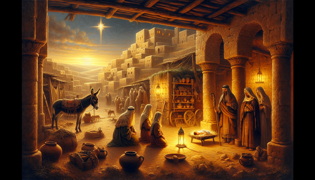
6. A Light for All
Word of the miraculous birth spread beyond Bethlehem’s walls. Messengers carried tidings over hills and desert plains, like sparrows releasing secrets to the wind. In homes and marketplaces, faces turned upward at the newly risen star, as if the heavens themselves had unrolled a scroll of hope. Mary and Joseph watched from their stable doorway, the child resting against Mary’s heart like a living lullaby.
Pilgrims came, pilgrims left. And in each pair of eyes, the child’s dawn-bright promise took root. The stable, once a cave of silence, became a beacon: a lamp hung in a window against the gloom. Olive branches and palms were pressed into the children’s hands, and songs—soft yet certain—wove through the alleys. Though the world beyond would soon know sorrow and sacrifice, on that holy night, every heart felt the stirrings of grace. Like a single candle lighting a thousand more, the babe at Bethlehem’s center would set the world aglow.
(The gentle rustle of palm fronds in the breeze, and the faint melody of paean rising through the night.)
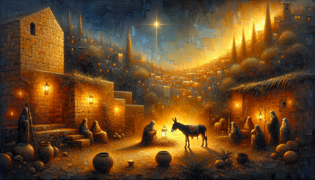
Conclusion
As dawn broke over the Judean hills, the stable door stood open to a world vast and waiting. Mary held her son against the rosy sky, Joseph kneeling beside her, eyes bright with unspoken dreams. In the cool morning air, shepherds’ pipes sounded a trembling melody, and children laughed through dusty streets. The star still hung above, steadfast as a promise carved into eternity.
Through centuries and nations, the story would travel—across desert sands and ocean waves, into every cradle of faith. Yet at its heart remained that humble Palestinian stable, where clay walls embraced the greatest light the world had ever known. And though empires rose and fell, mountains eroded, and languages shifted like desert dunes, the gentle breath of that newborn child would whisper hope into every age. In that silent cave, redemption found its home—an ember set alight, destined to kindle hearts until the end of time.

















